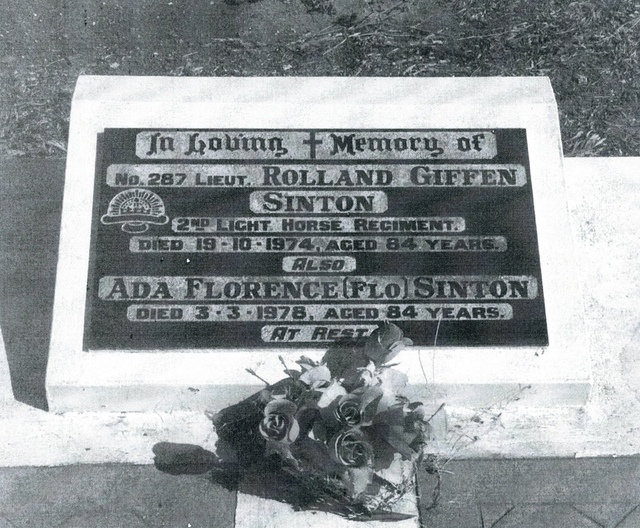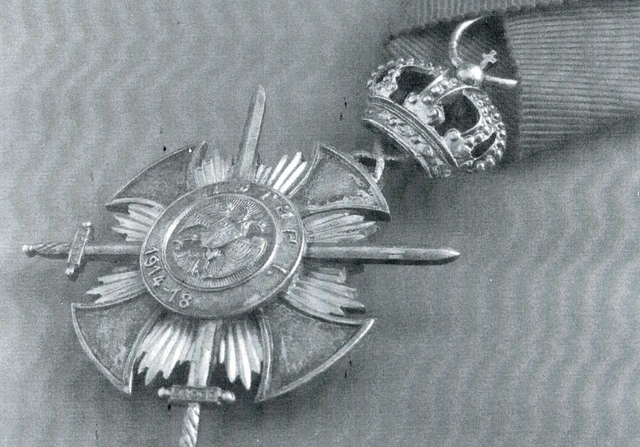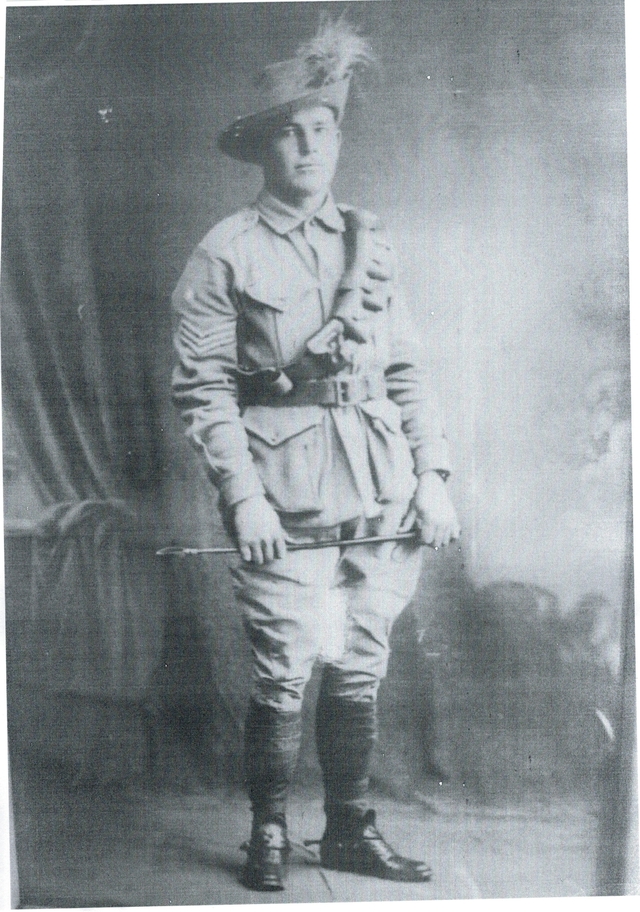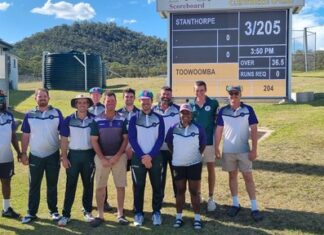I recently wrote the story of Sergeant John Fleet of the 15th Battalion who was awarded the French Medaille Militaire which was established in 1852 by the first President of the French Republic, Napoleon Bonaparte. It was a rare honor as foreign awards were not really encouraged by Australian Military authorities. In my research into Anzac heroes, I came across another foreign award conferred by the King of Serbia on 30th December 1916 on Lieutenant Rolland Giffin Sinton, entitled the Silver Cross of Karageorge, second class. Rolland Sinton won the Serbian Cross for bravery and service during operations with the Serbian army in battles around Romani and Salonika. In August 1916, allied forces in the town numbered around 1,500 Australian and New Zealand Light Horsemen served alongside the small Serbian army on the Salonika Front. Foreign bravery awards were promulgated in the Commonwealth Gazette which gave them similar status as British and Australian awards. Rolland Sinton led a colorful life and although highlighted by this award, he was just a young man from Allora who, like many of his time, volunteered to serve his country and here is his story.
Rolland Giffen Sinton was born on the 30th. October 1889 at Allora, in Southern Queensland. He was the son of David Sinton and attended the local State School before working on their “WYON” farming property as a drover. He even experienced the hard work of a Drover and once went on a long cattle drive with a young friend after leaving school. When all young men were encouraged to do a form of military training as the clouds of war were appearing over a politically hostile Europe, Rolland joined the local Light Horse Brigade and spent 7 years in training while attaining the rank of Corporal, before Australia called for volunteers to enlist.
On 21st August 1914, Rolland made the decision to enlist in the Australian Imperial Forces at Allora and a was sent to Brisbane’s Fraser Paddock for military training, before embarking on the “Star of England” bound for Alexandria, Egypt. At this stage, the Anzacs on Gallipoli were having problems with high casualty rates so Rolland and his battalion were diverted to the Gallipoli Peninsula to aid the embattled Anzacs on the 4th. July 1915. It was here that Rolland’s natural leadership ability came to the fore and he was quickly promoted to Sergeant on the 4th. July 1915. After suffering mumps, Rolland spent a period at Murdos Casualty Clearance Station (CCS) on Lemnos before being transferred back to Alexandria on the 5th. January 1916 via the HT “New Caledonia”, to join the Australian Light Horse at Tukn Al Khail. Rolland’s Regiment fought in the Desert campaigns and was involved in battles at Mina, Salonika and Romani with General Harry Chauvel’s Light Horse Brigade. It was in the Romani battle on the 3 -5 August at the Sinai Peninsula that Rolland was awarded the Serbian Star of Karageorge with Swords, for his bravery in assisting Serbian forces in the desert campaigns. Members of the Australian Light Horse were awarded the Serbian Star of Karageorge for their battlefield bravery while assisting the Serbian Army in World War 1, particularly as they supported the Serbian State against Austro-Hungarian forces. The Star was granted to foreign recipients, including British officers for their valor on the battlefield. Records show that only two were awarded to Light Horsemen of which one was Rolland in 1916 and conferred by the King of Serbia on the 30th. December 1916.
The Romani battle fought on the Sinai Peninsula against the Ottoman forces was possibly the turning point in the desert campaign where the Anzac forces, outnumbered by the Turkish forces, repelled an attack by the Turks as the Anzacs bravely fought on foot and counter attacked with bayonets and rifles. In August 1916, an Australian Light Horse Remount Unit was part of the Allied forces that fought in Salonika, when 1,500 Australians and New Zealanders, as well as nurses, served on the Salonika Front.
Rolland was granted a commission on July 4th. 1917 and was posted to the Australian army camp at Zeitoun, near Cairo, for officer training. Here, once again, Rolland showed that he was a highly impressive officer and his Commanding Officer, Lieutenant Colonel Bourne, recorded this when he wrote this report on completion of his training:
“A very capable and conscientious officer who has hardly missed an engagement with the Regiment.
He is a particularly good scout and was the first British officer to enter Madeba when the light Horse
Regiment took the town. His professional knowledge, leadership, discipline and capacity good.
Not suitable for staff work. Recommended for promotion. He has qualified at following schools in
Lewis gun, general and cavalry work”.
In the final stages of the Desert Campaign in the Middle East. A war weary Rolland Giffin Sinton returned home to Australia after a short visit in Ireland to meet his Irish relatives in County Armagh. However, Australia was what he missed most so he eventually embarked on board the HT “King Frederick August” arriving home on 20th.June 1919 and discharged on 24th September 1919.
Rolland returned to the family farm as this is the life he wanted to lead after the high stress of the battlefield. The quietness and solitude became a form of therapy from the desert campaigns. At the age of 31, Rolland met and courted a young nurse named Ada Masters, also an Allora resident whose family had a farm at Forest Springs. Rolland helped on the farm until he decided to take up share farming at nearby West Talgai where he and Ada had eight children over the years. After the children all grew up and left home, Rolland and Ada found that the Government land changes, and land taxes were becoming too much so they decided to retire after 40 years on the farm and moved to Drayton Street in Allora for the remainder of his life as a highly respected ex- Anzac. Sadly, both Rolland and Ada passed away at the age of 84 and now lie at rest side by side in the Allora cemetery.
Rolland Giffen Sinton led a remarkable life. His military record showed that he was a born soldier from his early life with the local Light Horse Brigade and became an Anzac on Gallipoli before serving with the 2/11th Light Horse Regiment in the Middle East. He appeared to be in Harry Chauval’s Desert Column in the desert battles to gain control of the Sinai Peninsula and survived. He worked his way up to be a commissioned officer and was awarded with a Serbian citation, and one wonders why he never received an Australian award. Rolland Giffen Sinton can comfortably lie at rest, as he will go down in military history as an Anzac with the legendary Light Horse Regiment. His courage and resilience will forever be recognized in Australian military history and the folklore of the Southern Downs. Finally, a quote that was passed on to me from an undisclosed source really helps sum up the life of Rolland Sinton. It went like this: “The peaceful rhythm of rural life serves as a testament to the enduring spirit of those who gave so much for their country, reminding us that true heroism lies in the lives built after the guns fall silent, and in the quiet pride of a life well lived”.










